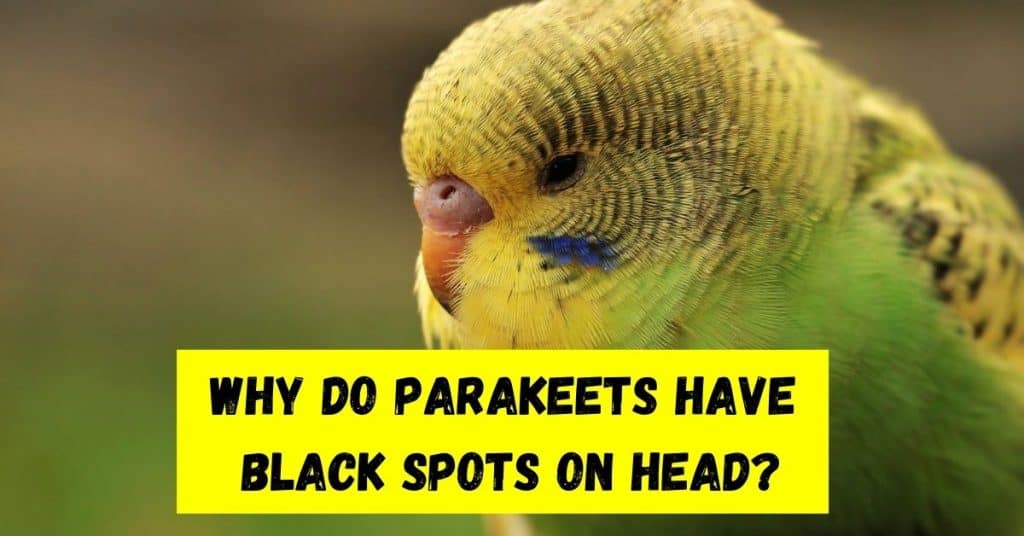A parakeet with black spots on his head can be startling and even scary, especially if you don’t know why they’re there or what they’re from. You can even wonder why do parakeets have block spots on head all of a sudden. You should know that they’re common enough that many veterinarians see them often!
So, why do parakeets have black spots on head?
Parakeets can develop black spots on head as a part of molting; but, in some cases, it can be due to genetics or mites, or stress. Young parakeets molt and have black spots while adult molts can develop such spots due to one of the other three reasons.
Having mentioned common reasons, let us look in detail at them and ways to prevent them as much as possible.
Common Reasons for Black Spots on Head of Parakeets
Here are some of the most common reasons why your parakeet has black spots on his head, along with some tips on how to keep them under control or prevent them altogether.
Molting
As a parakeet ages, he may begin to lose feathers and develop new ones. This is referred to as molting and can continue for years as your bird matures. These black spots on your parakeet are from his molting process and should pass in time as he sheds his old feathers and grows new ones.
If your parakeet is suddenly losing feathers, here is a guide for you – Why is parakeet losing feathers?
Solution
Feeding him a proper diet and plenty of water will help keep him hydrated during his molt. Without enough water, he’ll likely have trouble getting rid of excess oils and acids that are stored in his preen gland at the base of his tail; these oils then travel up through his body and onto his head where they appear as large black spots.
If these spots aren’t treated with a warm shower once or twice daily, you could find yourself cleaning oil off your walls! Just remember: You should only wash about one-quarter of your bird’s body at a time so that he doesn’t get cold or experience stress (birds don’t deal well with either!). When showering, it’s best to use lukewarm water instead of hot because it isn’t as drying when applied directly to their skin.
Genetics
Sometimes, black spots on parakeet heads are caused by genetics. Just like in humans, parakeets can inherit physical traits from their parents. If your pet’s parent or grandparent had similar markings, your bird might develop them as well. However, genetics don’t account for all instances of these types of black markings on parakeet heads.
Solution
If you think that your bird might have inherited its black spots from his family, then genetics are to blame. In most cases, parakeet owners don’t need to do anything about inherited traits—as long as their pet is happy and healthy, it doesn’t matter if they have black spots on their head or not. You can just enjoy your bird for who he is.
Mites
Mites are microscopic parasites that live on your bird. The only way to determine whether a black spot is caused by mites is to get a magnifying glass and take a closer look at it. Mites leave specks of red or black color as they pass through feathers. While most birds develop an immune system that keeps mites from harming them, some young birds can become very ill if they are infested with them.
Solution
See an avian vet immediately if you suspect your parakeet has mites! There are treatments available; however, symptoms must be caught early for treatment to be effective. When left untreated, severe mite infections can lead to skin disorders in your bird. It’s difficult for humans to detect these spots without magnification.
These black spots on birds aren’t concerning unless you see flaky spots elsewhere in addition to the spotting or other unusual behavior from your feathered friend.
Stress
Stress in parakeets can occur when they are kept in cages that are too small, or when they are exposed to something frightening or unpleasant. This is actually a very common cause of feather plucking and self-mutilation in birds. If you notice black spots on your parakeet’s head and it appears to be a new issue, try speaking calmly and reassuringly to him and see if he seems stressed. If so, consider moving his cage to another room for a few days until he seems more relaxed.
As a result of stress, in some birds, you can also spot sudden loss of weight. Here is a guide – How to make cockatiel gain weight?
Solution
Is your parakeet alone? Here is a guide that answers – Can parakeets live alone?
You should also give him plenty of space and interact with him as often as possible. Develop slow and soft touches. Remember, never scold a bird for mutilating himself; instead, immediately move his cage away from any potentially stressful stimuli (e.g., loud noise). After some time has passed and your bird’s feathers have grown back, he should stop chewing at himself.
Conclusion
Sudden signs on your parakeet like black spots on head can be so alarming if you don’t address them immediately.
The advantage of parakeets is that they are social and can easily be trained to come to you so you can examine and arrive at a solution. This article has covered common reasons.
If you find that your parakeet has been behaving abnormally after black signs, it is better to take him/her to a vet.
